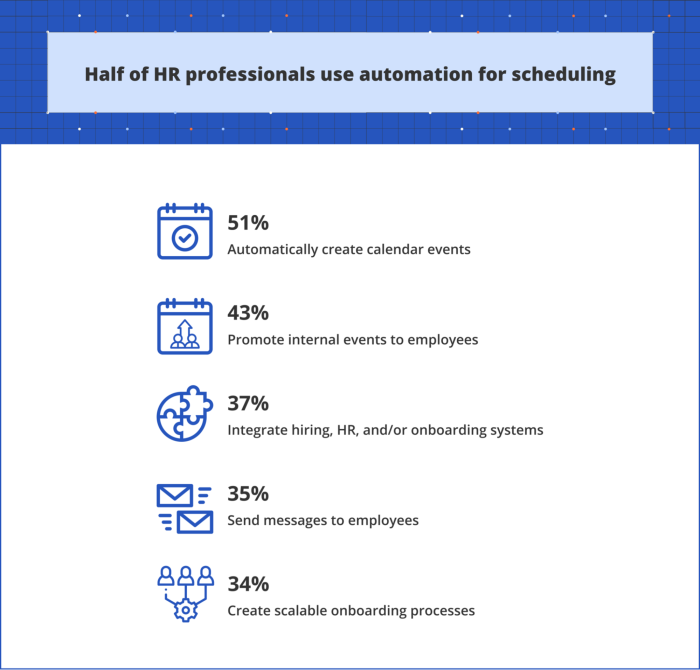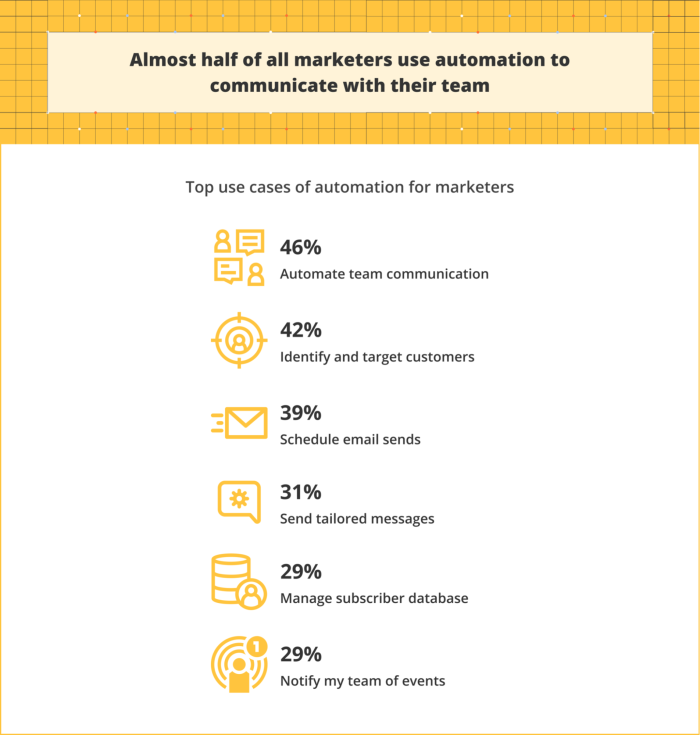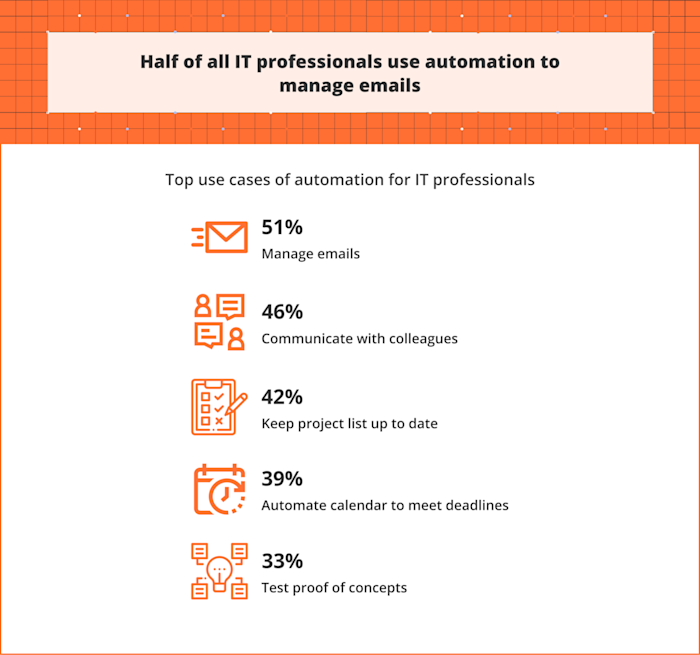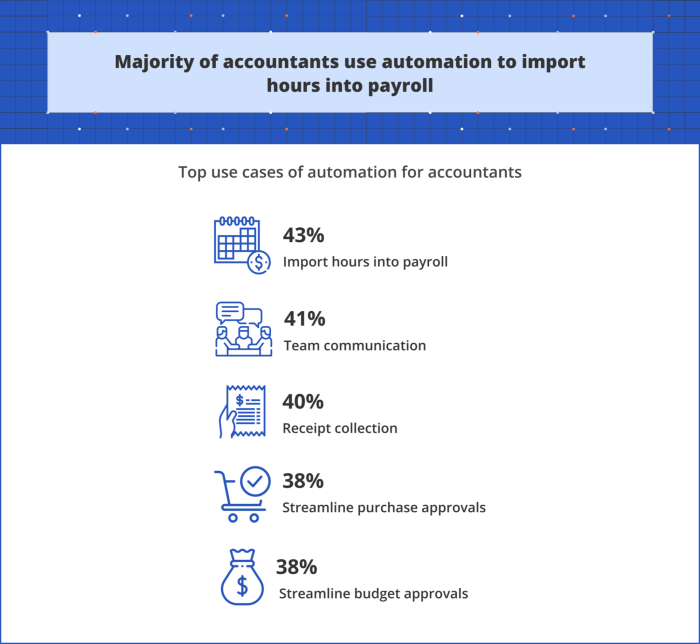Automation tools are becoming increasingly common in the workplace, helping employees in all roles be more productive throughout the day and allowing them to log off feeling confident about both the work they’ve done and what’s on their plate moving forward.
But automation isn’t one-size-fits-all: many roles use automation differently. In order to get a better idea of how people in various roles use automation—and why—we polled 1,500 knowledge workers in Marketing, IT, Accounting, HR, and Sales / Customer Service in small-medium businesses across the U.S. Here’s what we found.
Table of Contents
Time savings is the top benefit of automation, and marketers are leading the pack
According to Zapier data, marketers save the most time with automation tools with an average of 25 hours saved each week. IT professionals weren’t far behind, and several other roles see massive time savings.
-
Marketers save 25 hours/week using automation
-
IT professionals save 20 hours/week using automation
-
Customer service representatives save 16 hours/week using automation
-
HR professionals save 8 hours/week using automation
-
Sales representatives save 6 hours/week using automation
-
Accountants save 4 hours/week using automation
The amount of time saved translates into each role’s loyalty toward automation. For example, marketers (86%), IT professionals (88%), and customer service representatives (79%) are also the most likely to say that they’ll implement automation software in their next role.
This makes sense, because according to our survey, the number one reason knowledge workers use automation is to save time (60%).
How do marketers use automation at work?
Marketers are saving the most time with automation, but what kinds of tasks is automation taking care of for them? Here’s what they said:
-
Automate team communication (46%)
-
Identify and target customers (42%)
-
Schedule email sends (38%)
-
Send tailored messages (31%)
-
Manage subscriber database (29%)
-
Notify my team of events (29%)
It’s clear that marketers are using automation in all aspects of their work, both internally and externally, throughout the marketing funnel.
The advantages of automation go beyond productivity
Workflow automation tools aren’t just leading to increased efficiency—they’re also creating happier and more successful employees. Marketers, for example, cite improved competence (38%), getting a raise (37%), and improved morale (35%) as the primary benefits of automation. And the trends are similar across roles.
-
Nearly 30% of knowledge workers say they received a raise or promotion as a result of using automation software. Additionally, knowledge workers say using automation tools improved their morale (35%), competence (34%), and confidence (32%) at work. No longer having to stress about tedious tasks, inaccurate data, and miscommunication can help create a happier and more confident workforce.
-
45% of knowledge workers reported feeling less burnout due to automation being used in the workforce. As knowledge workers adapted to the work-from-home life, automation tools helped combat the burnout that comes with what can seem like a neverending workday. Almost 45% said automation tools helped reduce stress, almost 40% said their overall mood improved, and almost 30% said they were more likely to take a vacation.
-
29% of knowledge workers said they were also more likely to stop working outside of standard work hours.
The benefits of automation differ depending on your role
While the overall trends are the same, automation can play different roles for different workers. For example:
-
Accountants cited reduced errors (33%) as one of the primary benefits of automation. Given the detail-oriented nature of this role—where human error can be detrimental—that makes sense.
-
IT professionals cited receiving a promotion (36%) as one of the primary benefits of automation. IT professionals are expected to help streamline other people’s work, so it’s understandable why using automation could help them get that promotion.
-
Sales and customer service representatives cited increased confidence (35%) as one of the primary benefits of automation. These high-pressure and often micro-managed roles are benefitting from the confidence automation can provide.
The point? Automation isn’t one-size-fits-all—how you use it, and the benefits you get from it, will vary depending on your role. Take a look at the appendix for more details on how each role uses automation.
Conclusion
More than half of knowledge workers—regardless of role—are using automation tools every day to save time and be more productive in their roles. But marketers are leading the pack in automation usage, and other roles will need to invest more in automation to catch up.
Appendix
Here’s the breakdown of how different roles use automation at work.
Deep dive: How HR professionals use automation at work

According to Zapier data, HR professionals save an average of 8 hours per week using automation. Here are the most common things HR professionals are automating:
-
Automatically create calendar events (51%)
-
Promote internal events to employees (43%)
-
Integrate hiring, HR, and/or onboarding systems (37%)
-
Send messages to employees (35%)
-
Create scalable onboarding processes (34%)
The top three benefits HR professionals get from using automation at work are:
74% of HR employees say they’ll implement automation software in their next role.
Deep dive: How marketers use automation at work

According to Zapier data, marketers save an average of 25 hours per week using automation. Here are the most common things marketers are automating:
-
Automate team communication (46%)
-
Identify and target customers (42%)
-
Schedule email sends (38%)
-
Send tailored messages (31%)
-
Manage subscriber database (29%)
-
Notify my team of events (29%)
The top three benefits marketers get from using automation at work are:
86% of marketers say they’ll implement automation software in their next role.
Deep dive: How IT professionals use automation at work

According to Zapier data, IT professionals save an average of 20 hours per week using automation. Here are the most common things IT professionals are automating:
-
Manage emails (51%)
-
Communicate with colleagues (46%)
-
Keep project list up to date (42%)
-
Automate calendar to meet deadlines (39%)
-
Test proof of concepts (32%)
The top three benefits IT professionals get from using automation at work are:
88% of IT professionals say they’ll implement automation software in their next role.
Deep dive: How accountants use automation at work

According to Zapier data, accountants save an average of 4 hours per week using automation. Here are the most common things accountants are automating:
-
Import hours into payroll (43%)
-
Team communication (41%)
-
Receipt collection (40%)
-
Streamline purchase approvals (38%)
-
Streamline budget approvals (38%)
The top three benefits accountants get from using automation at work are:
67% of accountants say they’ll implement automation software in their next role.
Deep dive: How sales and customer service professionals use automation at work

According to Zapier data, sales and customer service representatives save an average of 6 and 16 hours per week using automation, respectively. The most common things they automate include:
-
Message my team about a lead or customer (39%)
-
Message a lead or customer (38%)
-
Invoice and payment collection (36%)
-
Sales forecasting (33%)
-
CRM hygiene (27%)
The top three benefits sales and customer service representatives get from using automation at work are:
79% of sales and customer service representatives say they’ll implement automation software in their next role.
Methodology
Zapier surveyed 2,000 U.S. knowledge workers from small and medium businesses [less than 250 total employees] on how they are using workflow automation tools in their particular job role. This survey was completed online in June 2021 and responses were random, voluntary, and completely anonymous.
[adsanity_group align=’alignnone’ num_ads=1 num_columns=1 group_ids=’15192′]
Need Any Technology Assistance? Call Pursho @ 0731-6725516







